Case Study: Ethical Leadership and Decision-Making at Origin Energy
VerifiedAdded on 2023/06/03
|12
|3967
|200
Case Study
AI Summary
This case study examines the ethical challenges faced by Origin Energy, focusing on issues such as workplace bullying, harassment, and the ethical implications of whistleblowing. It analyzes the company's response to gas well leaks and the subsequent actions of a whistleblower, Sally McDow. The analysis applies the AAA ethical decision-making model to evaluate McDow's decision to report unethical conduct. Furthermore, it discusses the rights of employers and employees in cases of discipline and dismissal, referencing the Fair Work Act 2009 in Australia. The case study concludes by recommending the implementation of an effective ethics program to address the identified issues and promote a more ethical organizational culture. This document is available on Desklib, where students can find a variety of solved assignments and past papers.
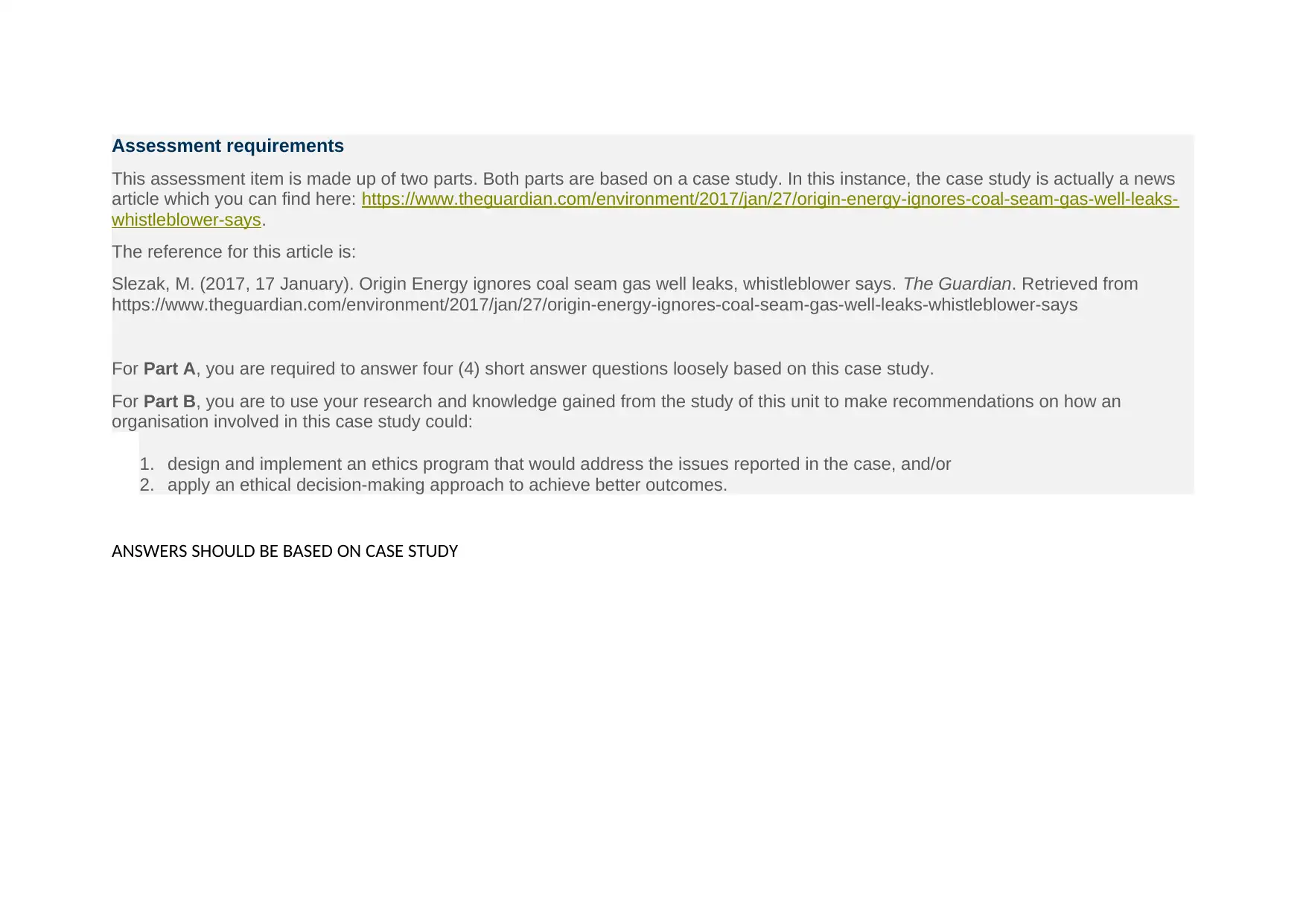
Assessment requirements
This assessment item is made up of two parts. Both parts are based on a case study. In this instance, the case study is actually a news
article which you can find here: https://www.theguardian.com/environment/2017/jan/27/origin-energy-ignores-coal-seam-gas-well-leaks-
whistleblower-says.
The reference for this article is:
Slezak, M. (2017, 17 January). Origin Energy ignores coal seam gas well leaks, whistleblower says. The Guardian. Retrieved from
https://www.theguardian.com/environment/2017/jan/27/origin-energy-ignores-coal-seam-gas-well-leaks-whistleblower-says
For Part A, you are required to answer four (4) short answer questions loosely based on this case study.
For Part B, you are to use your research and knowledge gained from the study of this unit to make recommendations on how an
organisation involved in this case study could:
1. design and implement an ethics program that would address the issues reported in the case, and/or
2. apply an ethical decision-making approach to achieve better outcomes.
ANSWERS SHOULD BE BASED ON CASE STUDY
This assessment item is made up of two parts. Both parts are based on a case study. In this instance, the case study is actually a news
article which you can find here: https://www.theguardian.com/environment/2017/jan/27/origin-energy-ignores-coal-seam-gas-well-leaks-
whistleblower-says.
The reference for this article is:
Slezak, M. (2017, 17 January). Origin Energy ignores coal seam gas well leaks, whistleblower says. The Guardian. Retrieved from
https://www.theguardian.com/environment/2017/jan/27/origin-energy-ignores-coal-seam-gas-well-leaks-whistleblower-says
For Part A, you are required to answer four (4) short answer questions loosely based on this case study.
For Part B, you are to use your research and knowledge gained from the study of this unit to make recommendations on how an
organisation involved in this case study could:
1. design and implement an ethics program that would address the issues reported in the case, and/or
2. apply an ethical decision-making approach to achieve better outcomes.
ANSWERS SHOULD BE BASED ON CASE STUDY
Paraphrase This Document
Need a fresh take? Get an instant paraphrase of this document with our AI Paraphraser
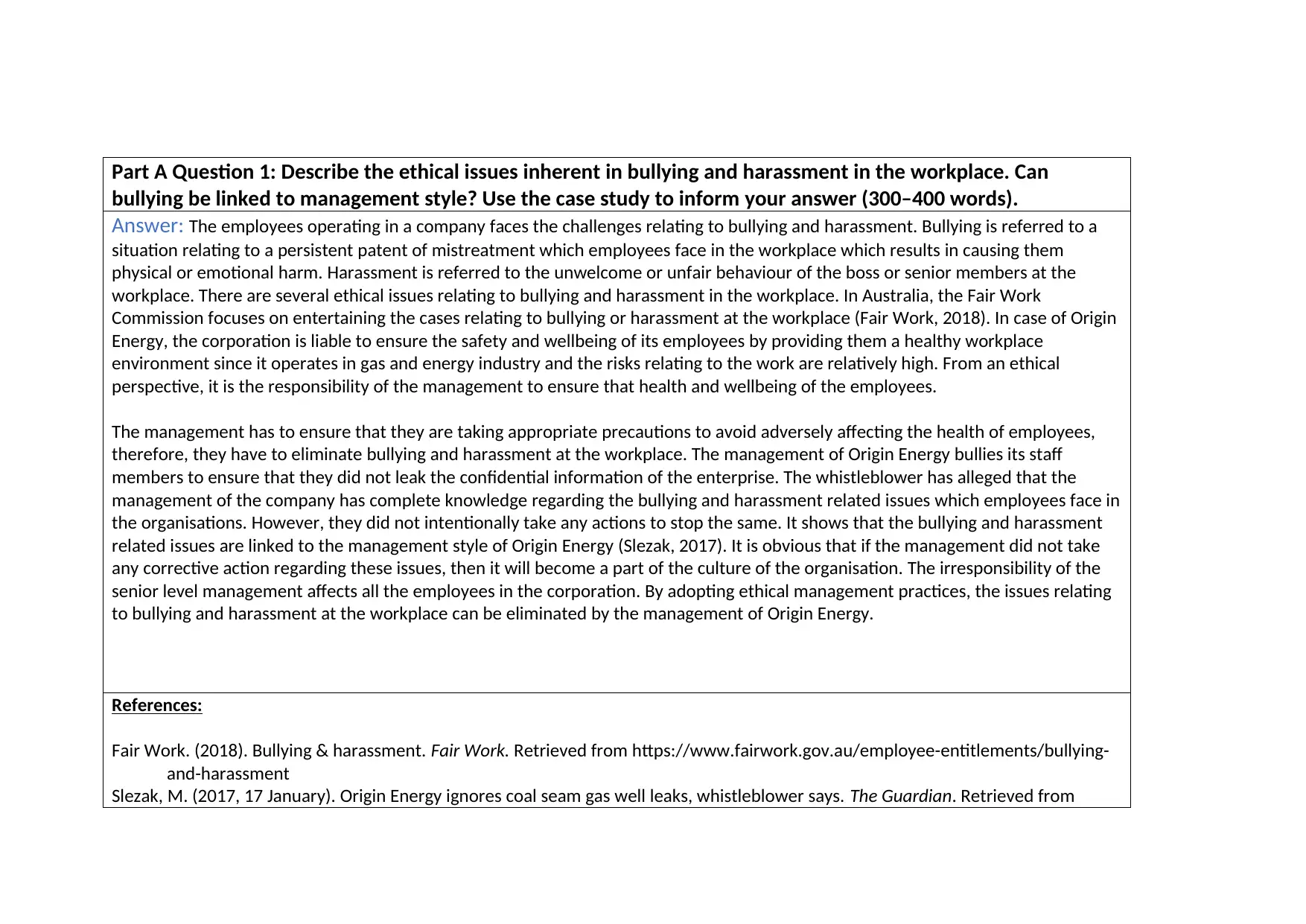
Part A Question 1: Describe the ethical issues inherent in bullying and harassment in the workplace. Can
bullying be linked to management style? Use the case study to inform your answer (300–400 words).
Answer: The employees operating in a company faces the challenges relating to bullying and harassment. Bullying is referred to a
situation relating to a persistent patent of mistreatment which employees face in the workplace which results in causing them
physical or emotional harm. Harassment is referred to the unwelcome or unfair behaviour of the boss or senior members at the
workplace. There are several ethical issues relating to bullying and harassment in the workplace. In Australia, the Fair Work
Commission focuses on entertaining the cases relating to bullying or harassment at the workplace (Fair Work, 2018). In case of Origin
Energy, the corporation is liable to ensure the safety and wellbeing of its employees by providing them a healthy workplace
environment since it operates in gas and energy industry and the risks relating to the work are relatively high. From an ethical
perspective, it is the responsibility of the management to ensure that health and wellbeing of the employees.
The management has to ensure that they are taking appropriate precautions to avoid adversely affecting the health of employees,
therefore, they have to eliminate bullying and harassment at the workplace. The management of Origin Energy bullies its staff
members to ensure that they did not leak the confidential information of the enterprise. The whistleblower has alleged that the
management of the company has complete knowledge regarding the bullying and harassment related issues which employees face in
the organisations. However, they did not intentionally take any actions to stop the same. It shows that the bullying and harassment
related issues are linked to the management style of Origin Energy (Slezak, 2017). It is obvious that if the management did not take
any corrective action regarding these issues, then it will become a part of the culture of the organisation. The irresponsibility of the
senior level management affects all the employees in the corporation. By adopting ethical management practices, the issues relating
to bullying and harassment at the workplace can be eliminated by the management of Origin Energy.
References:
Fair Work. (2018). Bullying & harassment. Fair Work. Retrieved from https://www.fairwork.gov.au/employee-entitlements/bullying-
and-harassment
Slezak, M. (2017, 17 January). Origin Energy ignores coal seam gas well leaks, whistleblower says. The Guardian. Retrieved from
bullying be linked to management style? Use the case study to inform your answer (300–400 words).
Answer: The employees operating in a company faces the challenges relating to bullying and harassment. Bullying is referred to a
situation relating to a persistent patent of mistreatment which employees face in the workplace which results in causing them
physical or emotional harm. Harassment is referred to the unwelcome or unfair behaviour of the boss or senior members at the
workplace. There are several ethical issues relating to bullying and harassment in the workplace. In Australia, the Fair Work
Commission focuses on entertaining the cases relating to bullying or harassment at the workplace (Fair Work, 2018). In case of Origin
Energy, the corporation is liable to ensure the safety and wellbeing of its employees by providing them a healthy workplace
environment since it operates in gas and energy industry and the risks relating to the work are relatively high. From an ethical
perspective, it is the responsibility of the management to ensure that health and wellbeing of the employees.
The management has to ensure that they are taking appropriate precautions to avoid adversely affecting the health of employees,
therefore, they have to eliminate bullying and harassment at the workplace. The management of Origin Energy bullies its staff
members to ensure that they did not leak the confidential information of the enterprise. The whistleblower has alleged that the
management of the company has complete knowledge regarding the bullying and harassment related issues which employees face in
the organisations. However, they did not intentionally take any actions to stop the same. It shows that the bullying and harassment
related issues are linked to the management style of Origin Energy (Slezak, 2017). It is obvious that if the management did not take
any corrective action regarding these issues, then it will become a part of the culture of the organisation. The irresponsibility of the
senior level management affects all the employees in the corporation. By adopting ethical management practices, the issues relating
to bullying and harassment at the workplace can be eliminated by the management of Origin Energy.
References:
Fair Work. (2018). Bullying & harassment. Fair Work. Retrieved from https://www.fairwork.gov.au/employee-entitlements/bullying-
and-harassment
Slezak, M. (2017, 17 January). Origin Energy ignores coal seam gas well leaks, whistleblower says. The Guardian. Retrieved from
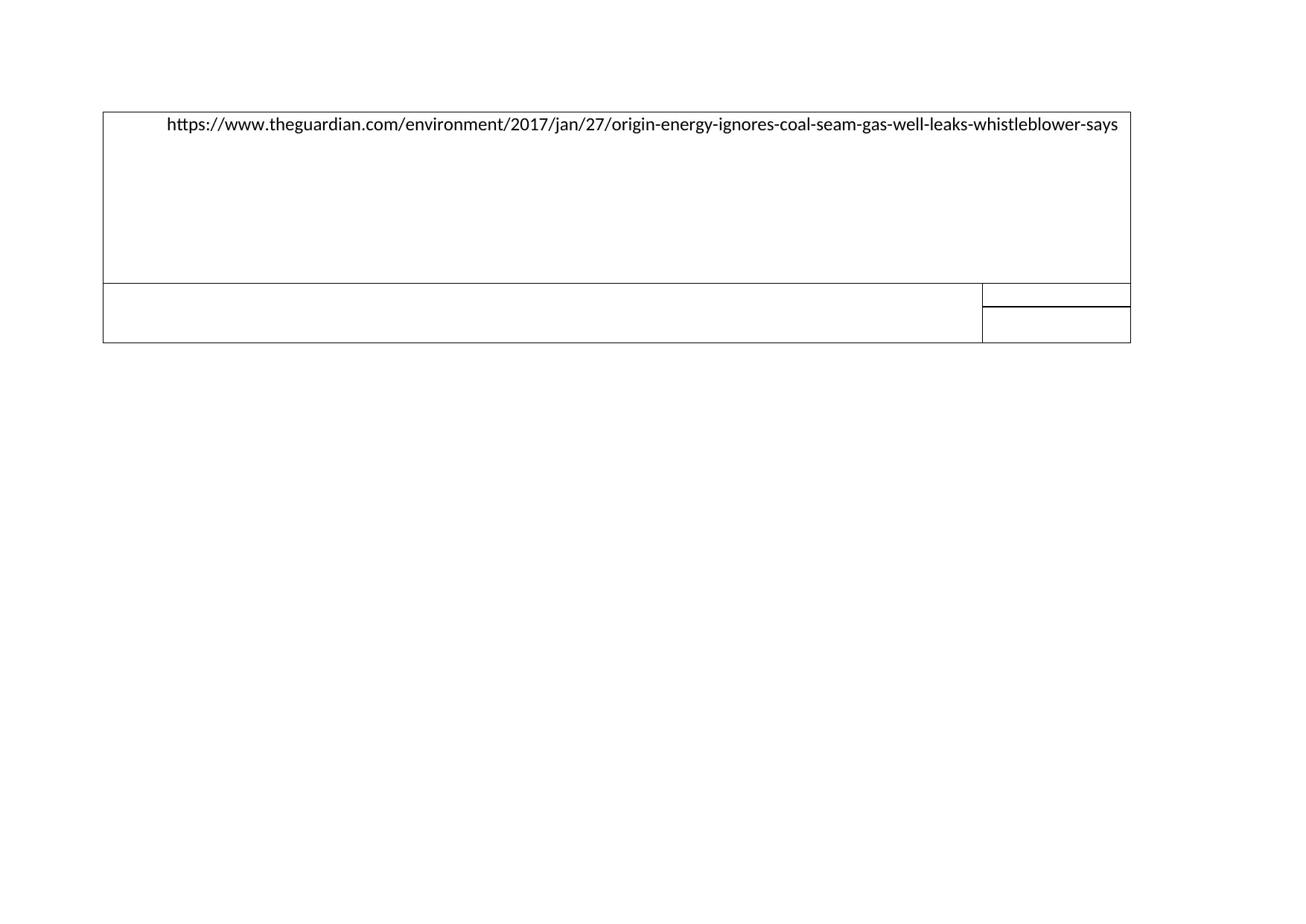
https://www.theguardian.com/environment/2017/jan/27/origin-energy-ignores-coal-seam-gas-well-leaks-whistleblower-says
⊘ This is a preview!⊘
Do you want full access?
Subscribe today to unlock all pages.

Trusted by 1+ million students worldwide
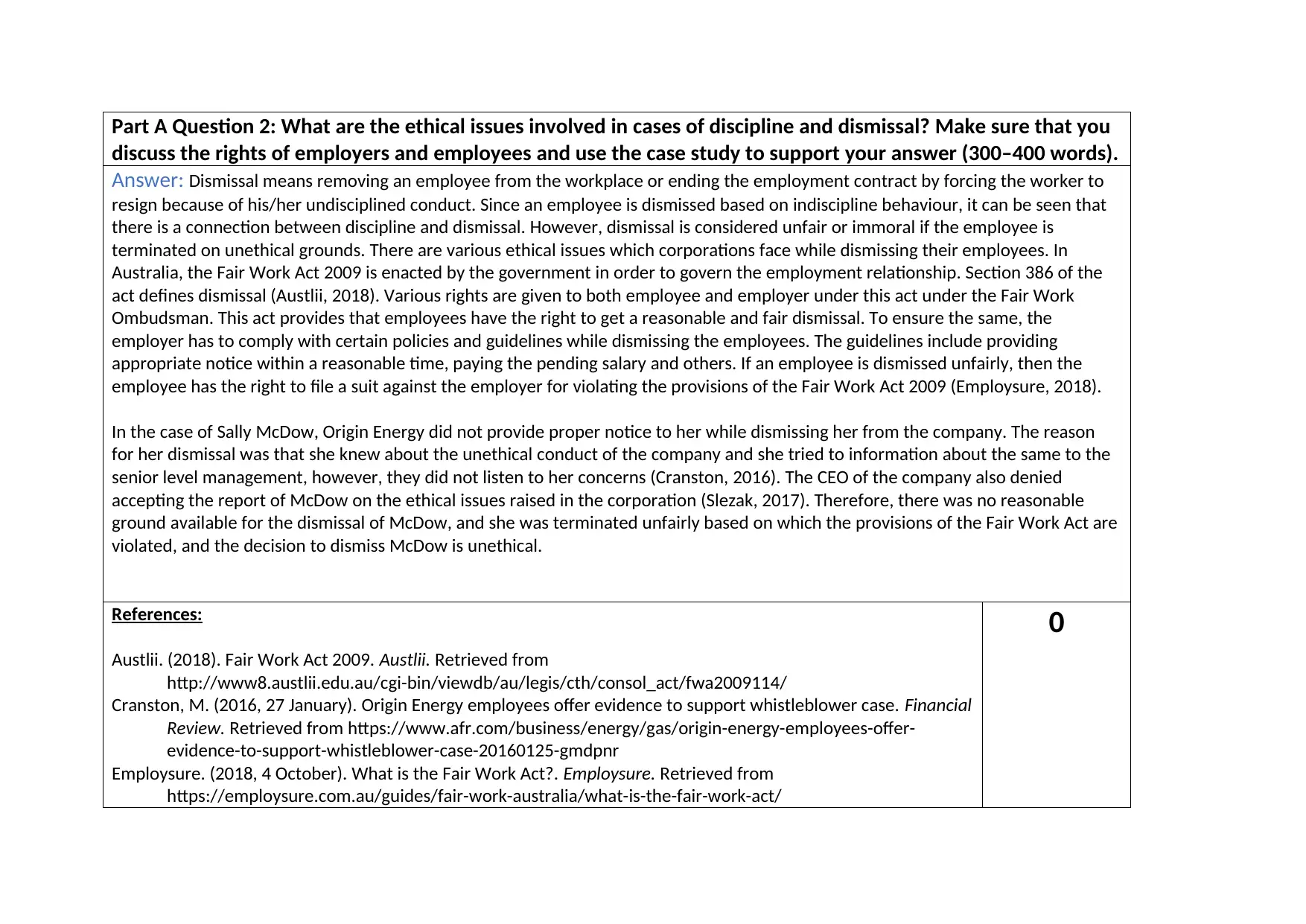
Part A Question 2: What are the ethical issues involved in cases of discipline and dismissal? Make sure that you
discuss the rights of employers and employees and use the case study to support your answer (300–400 words).
Answer: Dismissal means removing an employee from the workplace or ending the employment contract by forcing the worker to
resign because of his/her undisciplined conduct. Since an employee is dismissed based on indiscipline behaviour, it can be seen that
there is a connection between discipline and dismissal. However, dismissal is considered unfair or immoral if the employee is
terminated on unethical grounds. There are various ethical issues which corporations face while dismissing their employees. In
Australia, the Fair Work Act 2009 is enacted by the government in order to govern the employment relationship. Section 386 of the
act defines dismissal (Austlii, 2018). Various rights are given to both employee and employer under this act under the Fair Work
Ombudsman. This act provides that employees have the right to get a reasonable and fair dismissal. To ensure the same, the
employer has to comply with certain policies and guidelines while dismissing the employees. The guidelines include providing
appropriate notice within a reasonable time, paying the pending salary and others. If an employee is dismissed unfairly, then the
employee has the right to file a suit against the employer for violating the provisions of the Fair Work Act 2009 (Employsure, 2018).
In the case of Sally McDow, Origin Energy did not provide proper notice to her while dismissing her from the company. The reason
for her dismissal was that she knew about the unethical conduct of the company and she tried to information about the same to the
senior level management, however, they did not listen to her concerns (Cranston, 2016). The CEO of the company also denied
accepting the report of McDow on the ethical issues raised in the corporation (Slezak, 2017). Therefore, there was no reasonable
ground available for the dismissal of McDow, and she was terminated unfairly based on which the provisions of the Fair Work Act are
violated, and the decision to dismiss McDow is unethical.
References:
Austlii. (2018). Fair Work Act 2009. Austlii. Retrieved from
http://www8.austlii.edu.au/cgi-bin/viewdb/au/legis/cth/consol_act/fwa2009114/
Cranston, M. (2016, 27 January). Origin Energy employees offer evidence to support whistleblower case. Financial
Review. Retrieved from https://www.afr.com/business/energy/gas/origin-energy-employees-offer-
evidence-to-support-whistleblower-case-20160125-gmdpnr
Employsure. (2018, 4 October). What is the Fair Work Act?. Employsure. Retrieved from
https://employsure.com.au/guides/fair-work-australia/what-is-the-fair-work-act/
0
discuss the rights of employers and employees and use the case study to support your answer (300–400 words).
Answer: Dismissal means removing an employee from the workplace or ending the employment contract by forcing the worker to
resign because of his/her undisciplined conduct. Since an employee is dismissed based on indiscipline behaviour, it can be seen that
there is a connection between discipline and dismissal. However, dismissal is considered unfair or immoral if the employee is
terminated on unethical grounds. There are various ethical issues which corporations face while dismissing their employees. In
Australia, the Fair Work Act 2009 is enacted by the government in order to govern the employment relationship. Section 386 of the
act defines dismissal (Austlii, 2018). Various rights are given to both employee and employer under this act under the Fair Work
Ombudsman. This act provides that employees have the right to get a reasonable and fair dismissal. To ensure the same, the
employer has to comply with certain policies and guidelines while dismissing the employees. The guidelines include providing
appropriate notice within a reasonable time, paying the pending salary and others. If an employee is dismissed unfairly, then the
employee has the right to file a suit against the employer for violating the provisions of the Fair Work Act 2009 (Employsure, 2018).
In the case of Sally McDow, Origin Energy did not provide proper notice to her while dismissing her from the company. The reason
for her dismissal was that she knew about the unethical conduct of the company and she tried to information about the same to the
senior level management, however, they did not listen to her concerns (Cranston, 2016). The CEO of the company also denied
accepting the report of McDow on the ethical issues raised in the corporation (Slezak, 2017). Therefore, there was no reasonable
ground available for the dismissal of McDow, and she was terminated unfairly based on which the provisions of the Fair Work Act are
violated, and the decision to dismiss McDow is unethical.
References:
Austlii. (2018). Fair Work Act 2009. Austlii. Retrieved from
http://www8.austlii.edu.au/cgi-bin/viewdb/au/legis/cth/consol_act/fwa2009114/
Cranston, M. (2016, 27 January). Origin Energy employees offer evidence to support whistleblower case. Financial
Review. Retrieved from https://www.afr.com/business/energy/gas/origin-energy-employees-offer-
evidence-to-support-whistleblower-case-20160125-gmdpnr
Employsure. (2018, 4 October). What is the Fair Work Act?. Employsure. Retrieved from
https://employsure.com.au/guides/fair-work-australia/what-is-the-fair-work-act/
0
Paraphrase This Document
Need a fresh take? Get an instant paraphrase of this document with our AI Paraphraser
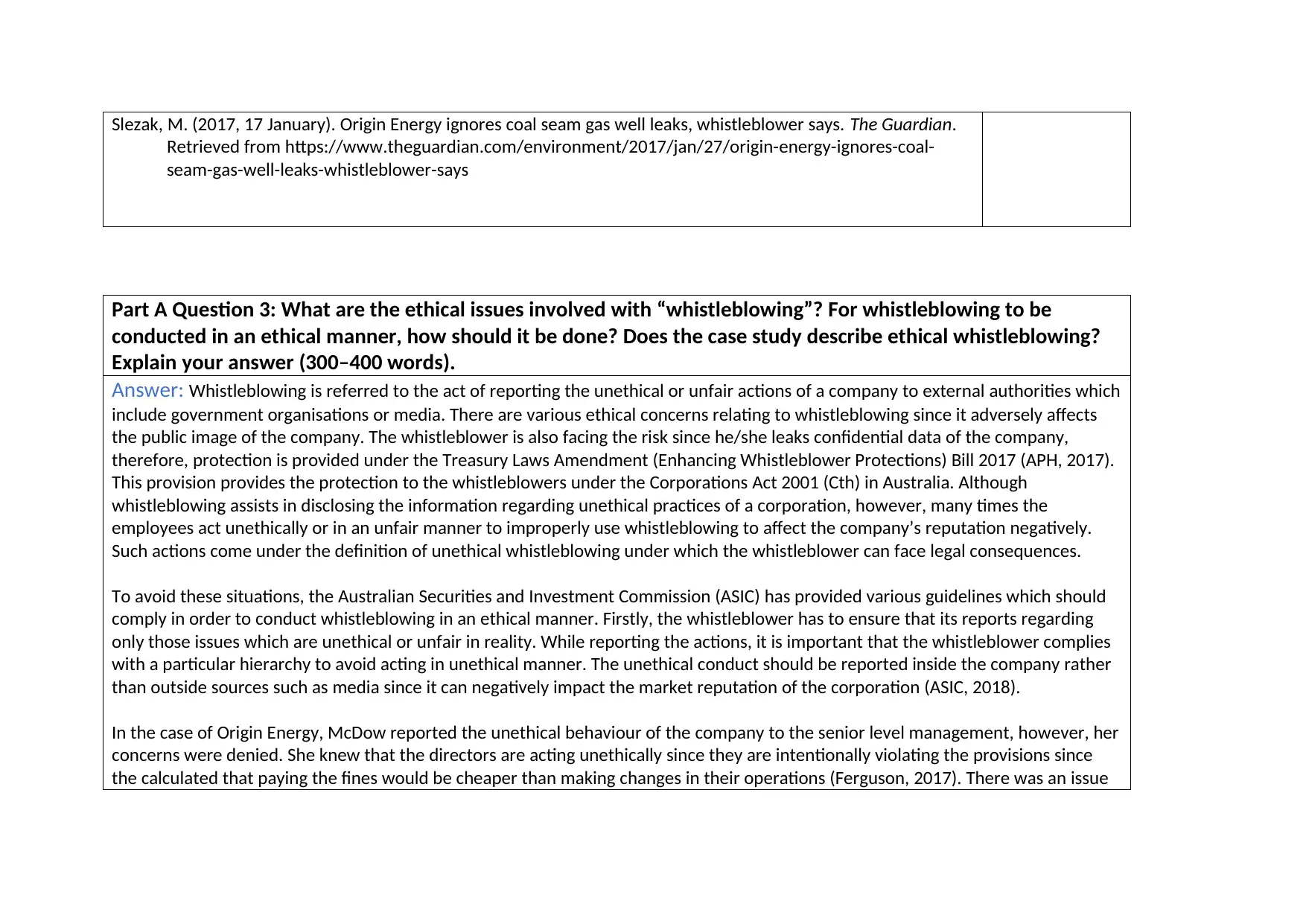
Slezak, M. (2017, 17 January). Origin Energy ignores coal seam gas well leaks, whistleblower says. The Guardian.
Retrieved from https://www.theguardian.com/environment/2017/jan/27/origin-energy-ignores-coal-
seam-gas-well-leaks-whistleblower-says
Part A Question 3: What are the ethical issues involved with “whistleblowing”? For whistleblowing to be
conducted in an ethical manner, how should it be done? Does the case study describe ethical whistleblowing?
Explain your answer (300–400 words).
Answer: Whistleblowing is referred to the act of reporting the unethical or unfair actions of a company to external authorities which
include government organisations or media. There are various ethical concerns relating to whistleblowing since it adversely affects
the public image of the company. The whistleblower is also facing the risk since he/she leaks confidential data of the company,
therefore, protection is provided under the Treasury Laws Amendment (Enhancing Whistleblower Protections) Bill 2017 (APH, 2017).
This provision provides the protection to the whistleblowers under the Corporations Act 2001 (Cth) in Australia. Although
whistleblowing assists in disclosing the information regarding unethical practices of a corporation, however, many times the
employees act unethically or in an unfair manner to improperly use whistleblowing to affect the company’s reputation negatively.
Such actions come under the definition of unethical whistleblowing under which the whistleblower can face legal consequences.
To avoid these situations, the Australian Securities and Investment Commission (ASIC) has provided various guidelines which should
comply in order to conduct whistleblowing in an ethical manner. Firstly, the whistleblower has to ensure that its reports regarding
only those issues which are unethical or unfair in reality. While reporting the actions, it is important that the whistleblower complies
with a particular hierarchy to avoid acting in unethical manner. The unethical conduct should be reported inside the company rather
than outside sources such as media since it can negatively impact the market reputation of the corporation (ASIC, 2018).
In the case of Origin Energy, McDow reported the unethical behaviour of the company to the senior level management, however, her
concerns were denied. She knew that the directors are acting unethically since they are intentionally violating the provisions since
the calculated that paying the fines would be cheaper than making changes in their operations (Ferguson, 2017). There was an issue
Retrieved from https://www.theguardian.com/environment/2017/jan/27/origin-energy-ignores-coal-
seam-gas-well-leaks-whistleblower-says
Part A Question 3: What are the ethical issues involved with “whistleblowing”? For whistleblowing to be
conducted in an ethical manner, how should it be done? Does the case study describe ethical whistleblowing?
Explain your answer (300–400 words).
Answer: Whistleblowing is referred to the act of reporting the unethical or unfair actions of a company to external authorities which
include government organisations or media. There are various ethical concerns relating to whistleblowing since it adversely affects
the public image of the company. The whistleblower is also facing the risk since he/she leaks confidential data of the company,
therefore, protection is provided under the Treasury Laws Amendment (Enhancing Whistleblower Protections) Bill 2017 (APH, 2017).
This provision provides the protection to the whistleblowers under the Corporations Act 2001 (Cth) in Australia. Although
whistleblowing assists in disclosing the information regarding unethical practices of a corporation, however, many times the
employees act unethically or in an unfair manner to improperly use whistleblowing to affect the company’s reputation negatively.
Such actions come under the definition of unethical whistleblowing under which the whistleblower can face legal consequences.
To avoid these situations, the Australian Securities and Investment Commission (ASIC) has provided various guidelines which should
comply in order to conduct whistleblowing in an ethical manner. Firstly, the whistleblower has to ensure that its reports regarding
only those issues which are unethical or unfair in reality. While reporting the actions, it is important that the whistleblower complies
with a particular hierarchy to avoid acting in unethical manner. The unethical conduct should be reported inside the company rather
than outside sources such as media since it can negatively impact the market reputation of the corporation (ASIC, 2018).
In the case of Origin Energy, McDow reported the unethical behaviour of the company to the senior level management, however, her
concerns were denied. She knew that the directors are acting unethically since they are intentionally violating the provisions since
the calculated that paying the fines would be cheaper than making changes in their operations (Ferguson, 2017). There was an issue
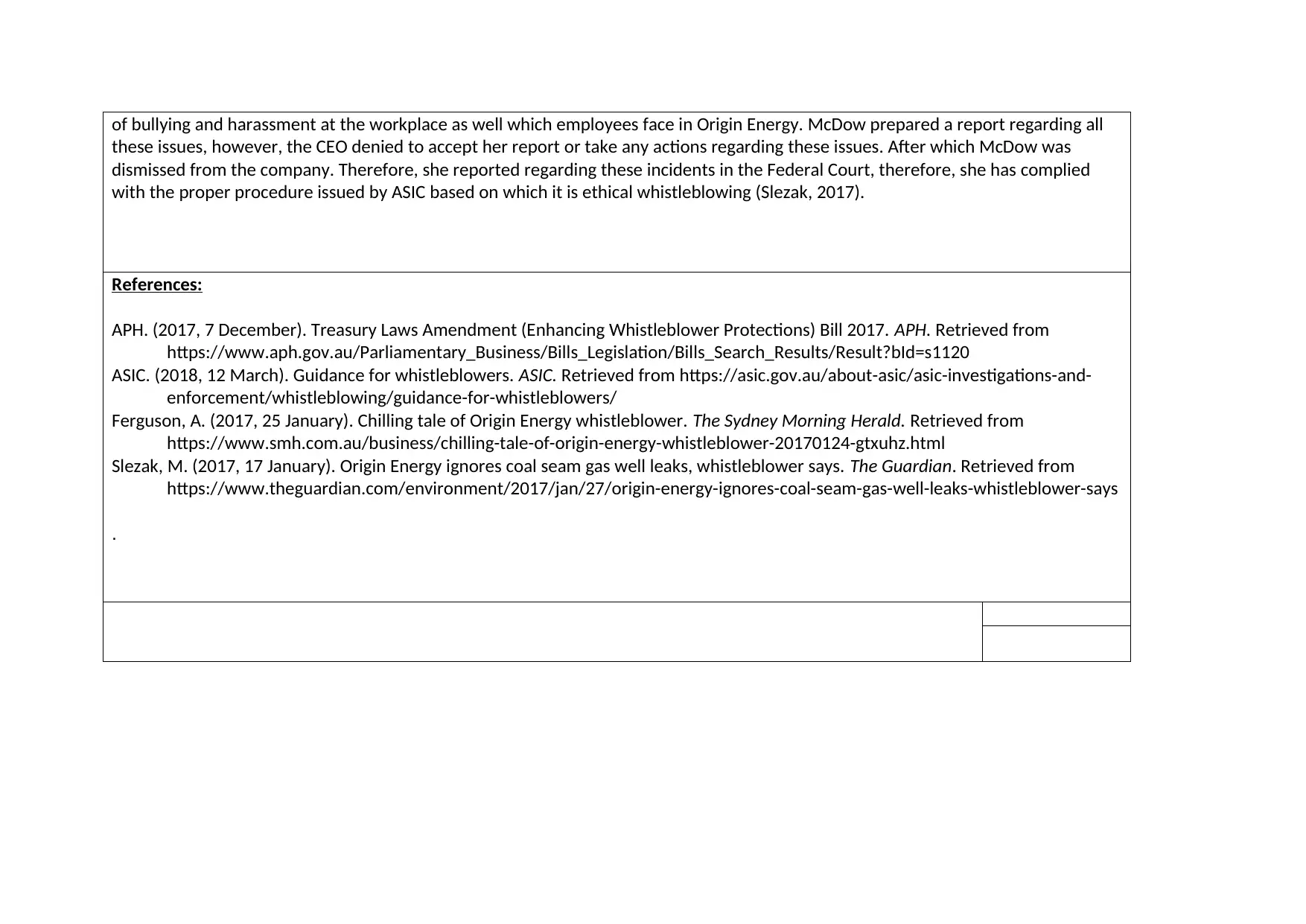
of bullying and harassment at the workplace as well which employees face in Origin Energy. McDow prepared a report regarding all
these issues, however, the CEO denied to accept her report or take any actions regarding these issues. After which McDow was
dismissed from the company. Therefore, she reported regarding these incidents in the Federal Court, therefore, she has complied
with the proper procedure issued by ASIC based on which it is ethical whistleblowing (Slezak, 2017).
References:
APH. (2017, 7 December). Treasury Laws Amendment (Enhancing Whistleblower Protections) Bill 2017. APH. Retrieved from
https://www.aph.gov.au/Parliamentary_Business/Bills_Legislation/Bills_Search_Results/Result?bId=s1120
ASIC. (2018, 12 March). Guidance for whistleblowers. ASIC. Retrieved from https://asic.gov.au/about-asic/asic-investigations-and-
enforcement/whistleblowing/guidance-for-whistleblowers/
Ferguson, A. (2017, 25 January). Chilling tale of Origin Energy whistleblower. The Sydney Morning Herald. Retrieved from
https://www.smh.com.au/business/chilling-tale-of-origin-energy-whistleblower-20170124-gtxuhz.html
Slezak, M. (2017, 17 January). Origin Energy ignores coal seam gas well leaks, whistleblower says. The Guardian. Retrieved from
https://www.theguardian.com/environment/2017/jan/27/origin-energy-ignores-coal-seam-gas-well-leaks-whistleblower-says
.
these issues, however, the CEO denied to accept her report or take any actions regarding these issues. After which McDow was
dismissed from the company. Therefore, she reported regarding these incidents in the Federal Court, therefore, she has complied
with the proper procedure issued by ASIC based on which it is ethical whistleblowing (Slezak, 2017).
References:
APH. (2017, 7 December). Treasury Laws Amendment (Enhancing Whistleblower Protections) Bill 2017. APH. Retrieved from
https://www.aph.gov.au/Parliamentary_Business/Bills_Legislation/Bills_Search_Results/Result?bId=s1120
ASIC. (2018, 12 March). Guidance for whistleblowers. ASIC. Retrieved from https://asic.gov.au/about-asic/asic-investigations-and-
enforcement/whistleblowing/guidance-for-whistleblowers/
Ferguson, A. (2017, 25 January). Chilling tale of Origin Energy whistleblower. The Sydney Morning Herald. Retrieved from
https://www.smh.com.au/business/chilling-tale-of-origin-energy-whistleblower-20170124-gtxuhz.html
Slezak, M. (2017, 17 January). Origin Energy ignores coal seam gas well leaks, whistleblower says. The Guardian. Retrieved from
https://www.theguardian.com/environment/2017/jan/27/origin-energy-ignores-coal-seam-gas-well-leaks-whistleblower-says
.
⊘ This is a preview!⊘
Do you want full access?
Subscribe today to unlock all pages.

Trusted by 1+ million students worldwide
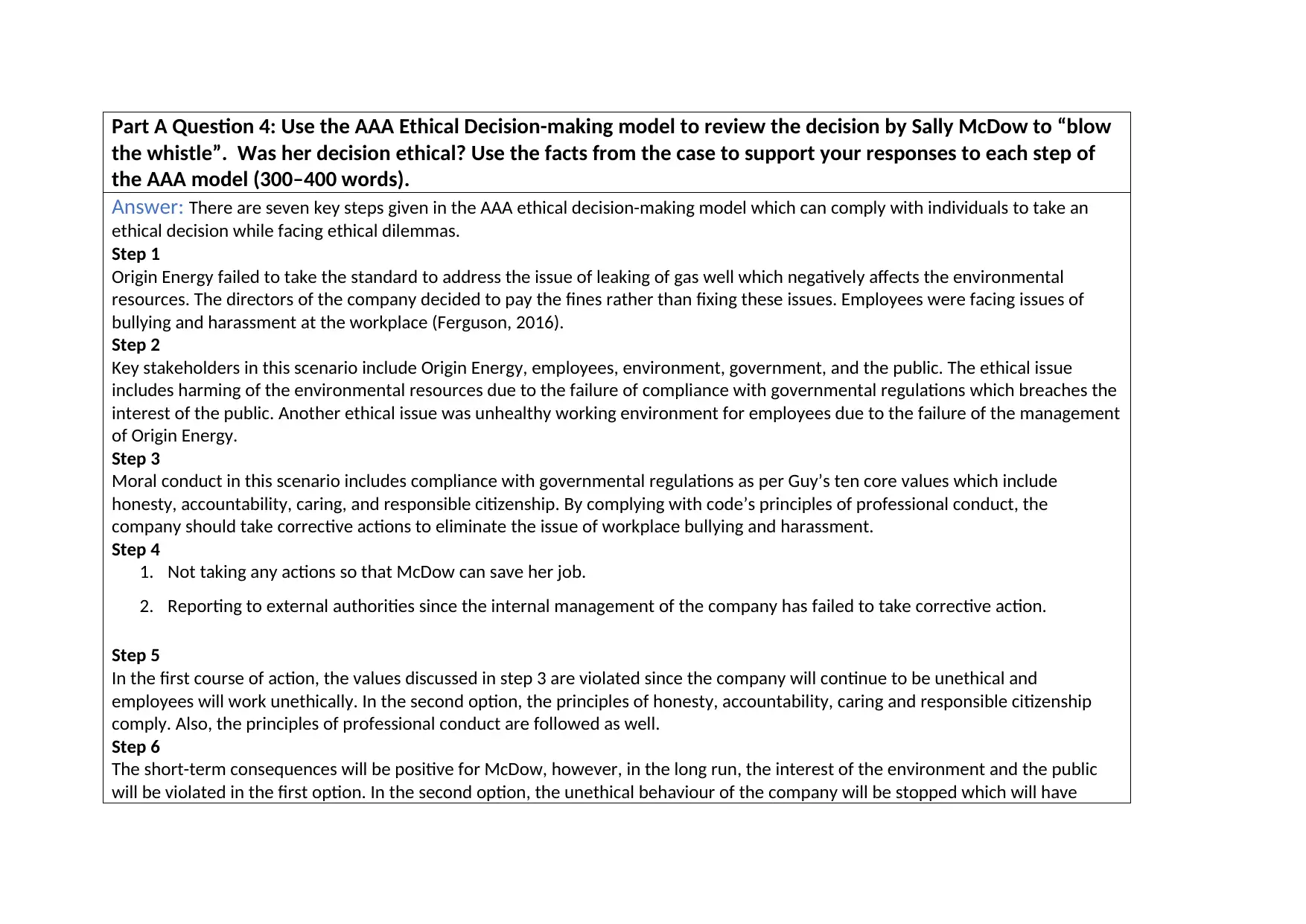
Part A Question 4: Use the AAA Ethical Decision-making model to review the decision by Sally McDow to “blow
the whistle”. Was her decision ethical? Use the facts from the case to support your responses to each step of
the AAA model (300–400 words).
Answer: There are seven key steps given in the AAA ethical decision-making model which can comply with individuals to take an
ethical decision while facing ethical dilemmas.
Step 1
Origin Energy failed to take the standard to address the issue of leaking of gas well which negatively affects the environmental
resources. The directors of the company decided to pay the fines rather than fixing these issues. Employees were facing issues of
bullying and harassment at the workplace (Ferguson, 2016).
Step 2
Key stakeholders in this scenario include Origin Energy, employees, environment, government, and the public. The ethical issue
includes harming of the environmental resources due to the failure of compliance with governmental regulations which breaches the
interest of the public. Another ethical issue was unhealthy working environment for employees due to the failure of the management
of Origin Energy.
Step 3
Moral conduct in this scenario includes compliance with governmental regulations as per Guy’s ten core values which include
honesty, accountability, caring, and responsible citizenship. By complying with code’s principles of professional conduct, the
company should take corrective actions to eliminate the issue of workplace bullying and harassment.
Step 4
1. Not taking any actions so that McDow can save her job.
2. Reporting to external authorities since the internal management of the company has failed to take corrective action.
Step 5
In the first course of action, the values discussed in step 3 are violated since the company will continue to be unethical and
employees will work unethically. In the second option, the principles of honesty, accountability, caring and responsible citizenship
comply. Also, the principles of professional conduct are followed as well.
Step 6
The short-term consequences will be positive for McDow, however, in the long run, the interest of the environment and the public
will be violated in the first option. In the second option, the unethical behaviour of the company will be stopped which will have
the whistle”. Was her decision ethical? Use the facts from the case to support your responses to each step of
the AAA model (300–400 words).
Answer: There are seven key steps given in the AAA ethical decision-making model which can comply with individuals to take an
ethical decision while facing ethical dilemmas.
Step 1
Origin Energy failed to take the standard to address the issue of leaking of gas well which negatively affects the environmental
resources. The directors of the company decided to pay the fines rather than fixing these issues. Employees were facing issues of
bullying and harassment at the workplace (Ferguson, 2016).
Step 2
Key stakeholders in this scenario include Origin Energy, employees, environment, government, and the public. The ethical issue
includes harming of the environmental resources due to the failure of compliance with governmental regulations which breaches the
interest of the public. Another ethical issue was unhealthy working environment for employees due to the failure of the management
of Origin Energy.
Step 3
Moral conduct in this scenario includes compliance with governmental regulations as per Guy’s ten core values which include
honesty, accountability, caring, and responsible citizenship. By complying with code’s principles of professional conduct, the
company should take corrective actions to eliminate the issue of workplace bullying and harassment.
Step 4
1. Not taking any actions so that McDow can save her job.
2. Reporting to external authorities since the internal management of the company has failed to take corrective action.
Step 5
In the first course of action, the values discussed in step 3 are violated since the company will continue to be unethical and
employees will work unethically. In the second option, the principles of honesty, accountability, caring and responsible citizenship
comply. Also, the principles of professional conduct are followed as well.
Step 6
The short-term consequences will be positive for McDow, however, in the long run, the interest of the environment and the public
will be violated in the first option. In the second option, the unethical behaviour of the company will be stopped which will have
Paraphrase This Document
Need a fresh take? Get an instant paraphrase of this document with our AI Paraphraser
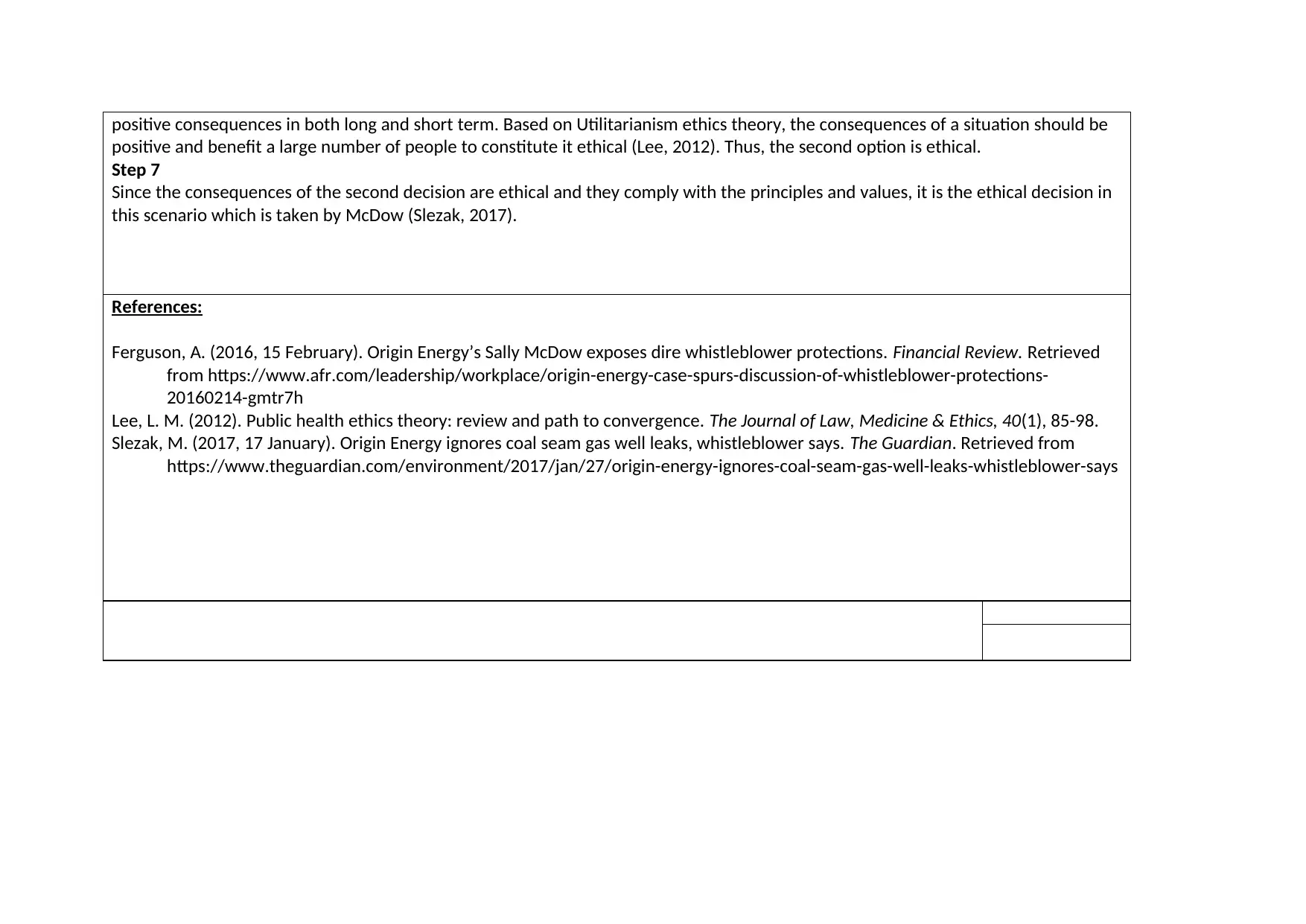
positive consequences in both long and short term. Based on Utilitarianism ethics theory, the consequences of a situation should be
positive and benefit a large number of people to constitute it ethical (Lee, 2012). Thus, the second option is ethical.
Step 7
Since the consequences of the second decision are ethical and they comply with the principles and values, it is the ethical decision in
this scenario which is taken by McDow (Slezak, 2017).
References:
Ferguson, A. (2016, 15 February). Origin Energy’s Sally McDow exposes dire whistleblower protections. Financial Review. Retrieved
from https://www.afr.com/leadership/workplace/origin-energy-case-spurs-discussion-of-whistleblower-protections-
20160214-gmtr7h
Lee, L. M. (2012). Public health ethics theory: review and path to convergence. The Journal of Law, Medicine & Ethics, 40(1), 85-98.
Slezak, M. (2017, 17 January). Origin Energy ignores coal seam gas well leaks, whistleblower says. The Guardian. Retrieved from
https://www.theguardian.com/environment/2017/jan/27/origin-energy-ignores-coal-seam-gas-well-leaks-whistleblower-says
positive and benefit a large number of people to constitute it ethical (Lee, 2012). Thus, the second option is ethical.
Step 7
Since the consequences of the second decision are ethical and they comply with the principles and values, it is the ethical decision in
this scenario which is taken by McDow (Slezak, 2017).
References:
Ferguson, A. (2016, 15 February). Origin Energy’s Sally McDow exposes dire whistleblower protections. Financial Review. Retrieved
from https://www.afr.com/leadership/workplace/origin-energy-case-spurs-discussion-of-whistleblower-protections-
20160214-gmtr7h
Lee, L. M. (2012). Public health ethics theory: review and path to convergence. The Journal of Law, Medicine & Ethics, 40(1), 85-98.
Slezak, M. (2017, 17 January). Origin Energy ignores coal seam gas well leaks, whistleblower says. The Guardian. Retrieved from
https://www.theguardian.com/environment/2017/jan/27/origin-energy-ignores-coal-seam-gas-well-leaks-whistleblower-says
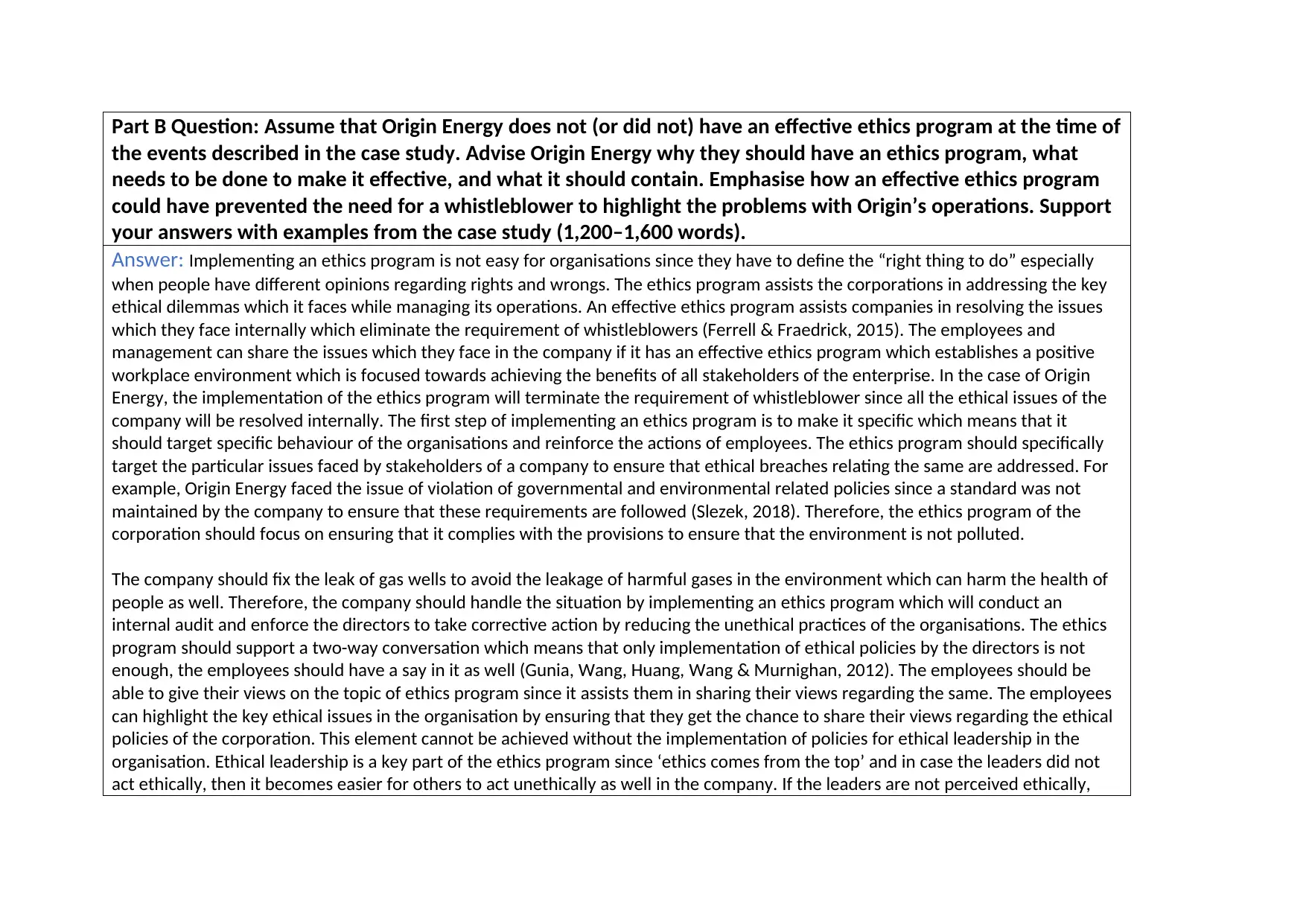
Part B Question: Assume that Origin Energy does not (or did not) have an effective ethics program at the time of
the events described in the case study. Advise Origin Energy why they should have an ethics program, what
needs to be done to make it effective, and what it should contain. Emphasise how an effective ethics program
could have prevented the need for a whistleblower to highlight the problems with Origin’s operations. Support
your answers with examples from the case study (1,200–1,600 words).
Answer: Implementing an ethics program is not easy for organisations since they have to define the “right thing to do” especially
when people have different opinions regarding rights and wrongs. The ethics program assists the corporations in addressing the key
ethical dilemmas which it faces while managing its operations. An effective ethics program assists companies in resolving the issues
which they face internally which eliminate the requirement of whistleblowers (Ferrell & Fraedrick, 2015). The employees and
management can share the issues which they face in the company if it has an effective ethics program which establishes a positive
workplace environment which is focused towards achieving the benefits of all stakeholders of the enterprise. In the case of Origin
Energy, the implementation of the ethics program will terminate the requirement of whistleblower since all the ethical issues of the
company will be resolved internally. The first step of implementing an ethics program is to make it specific which means that it
should target specific behaviour of the organisations and reinforce the actions of employees. The ethics program should specifically
target the particular issues faced by stakeholders of a company to ensure that ethical breaches relating the same are addressed. For
example, Origin Energy faced the issue of violation of governmental and environmental related policies since a standard was not
maintained by the company to ensure that these requirements are followed (Slezek, 2018). Therefore, the ethics program of the
corporation should focus on ensuring that it complies with the provisions to ensure that the environment is not polluted.
The company should fix the leak of gas wells to avoid the leakage of harmful gases in the environment which can harm the health of
people as well. Therefore, the company should handle the situation by implementing an ethics program which will conduct an
internal audit and enforce the directors to take corrective action by reducing the unethical practices of the organisations. The ethics
program should support a two-way conversation which means that only implementation of ethical policies by the directors is not
enough, the employees should have a say in it as well (Gunia, Wang, Huang, Wang & Murnighan, 2012). The employees should be
able to give their views on the topic of ethics program since it assists them in sharing their views regarding the same. The employees
can highlight the key ethical issues in the organisation by ensuring that they get the chance to share their views regarding the ethical
policies of the corporation. This element cannot be achieved without the implementation of policies for ethical leadership in the
organisation. Ethical leadership is a key part of the ethics program since ‘ethics comes from the top’ and in case the leaders did not
act ethically, then it becomes easier for others to act unethically as well in the company. If the leaders are not perceived ethically,
the events described in the case study. Advise Origin Energy why they should have an ethics program, what
needs to be done to make it effective, and what it should contain. Emphasise how an effective ethics program
could have prevented the need for a whistleblower to highlight the problems with Origin’s operations. Support
your answers with examples from the case study (1,200–1,600 words).
Answer: Implementing an ethics program is not easy for organisations since they have to define the “right thing to do” especially
when people have different opinions regarding rights and wrongs. The ethics program assists the corporations in addressing the key
ethical dilemmas which it faces while managing its operations. An effective ethics program assists companies in resolving the issues
which they face internally which eliminate the requirement of whistleblowers (Ferrell & Fraedrick, 2015). The employees and
management can share the issues which they face in the company if it has an effective ethics program which establishes a positive
workplace environment which is focused towards achieving the benefits of all stakeholders of the enterprise. In the case of Origin
Energy, the implementation of the ethics program will terminate the requirement of whistleblower since all the ethical issues of the
company will be resolved internally. The first step of implementing an ethics program is to make it specific which means that it
should target specific behaviour of the organisations and reinforce the actions of employees. The ethics program should specifically
target the particular issues faced by stakeholders of a company to ensure that ethical breaches relating the same are addressed. For
example, Origin Energy faced the issue of violation of governmental and environmental related policies since a standard was not
maintained by the company to ensure that these requirements are followed (Slezek, 2018). Therefore, the ethics program of the
corporation should focus on ensuring that it complies with the provisions to ensure that the environment is not polluted.
The company should fix the leak of gas wells to avoid the leakage of harmful gases in the environment which can harm the health of
people as well. Therefore, the company should handle the situation by implementing an ethics program which will conduct an
internal audit and enforce the directors to take corrective action by reducing the unethical practices of the organisations. The ethics
program should support a two-way conversation which means that only implementation of ethical policies by the directors is not
enough, the employees should have a say in it as well (Gunia, Wang, Huang, Wang & Murnighan, 2012). The employees should be
able to give their views on the topic of ethics program since it assists them in sharing their views regarding the same. The employees
can highlight the key ethical issues in the organisation by ensuring that they get the chance to share their views regarding the ethical
policies of the corporation. This element cannot be achieved without the implementation of policies for ethical leadership in the
organisation. Ethical leadership is a key part of the ethics program since ‘ethics comes from the top’ and in case the leaders did not
act ethically, then it becomes easier for others to act unethically as well in the company. If the leaders are not perceived ethically,
⊘ This is a preview!⊘
Do you want full access?
Subscribe today to unlock all pages.

Trusted by 1+ million students worldwide
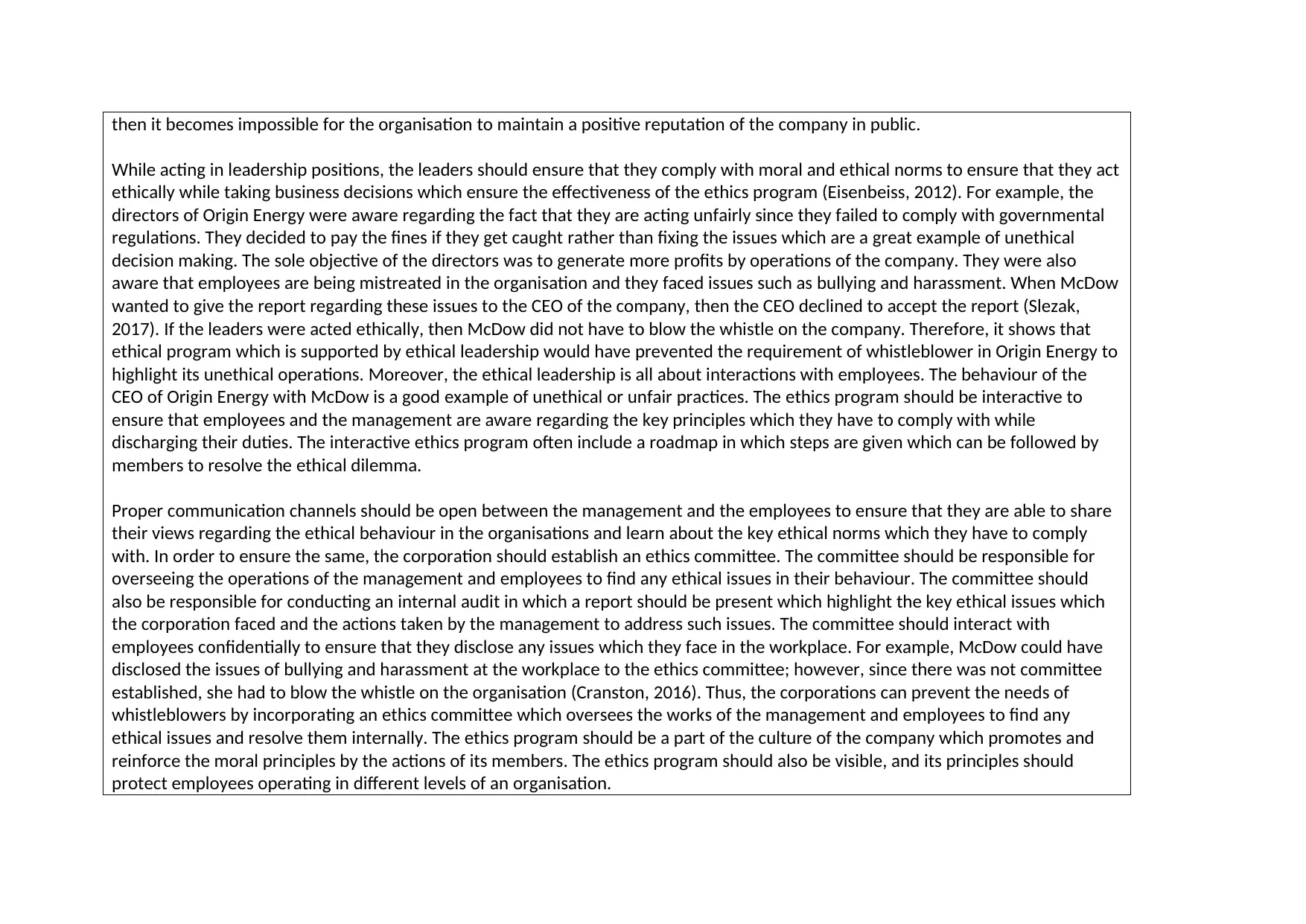
then it becomes impossible for the organisation to maintain a positive reputation of the company in public.
While acting in leadership positions, the leaders should ensure that they comply with moral and ethical norms to ensure that they act
ethically while taking business decisions which ensure the effectiveness of the ethics program (Eisenbeiss, 2012). For example, the
directors of Origin Energy were aware regarding the fact that they are acting unfairly since they failed to comply with governmental
regulations. They decided to pay the fines if they get caught rather than fixing the issues which are a great example of unethical
decision making. The sole objective of the directors was to generate more profits by operations of the company. They were also
aware that employees are being mistreated in the organisation and they faced issues such as bullying and harassment. When McDow
wanted to give the report regarding these issues to the CEO of the company, then the CEO declined to accept the report (Slezak,
2017). If the leaders were acted ethically, then McDow did not have to blow the whistle on the company. Therefore, it shows that
ethical program which is supported by ethical leadership would have prevented the requirement of whistleblower in Origin Energy to
highlight its unethical operations. Moreover, the ethical leadership is all about interactions with employees. The behaviour of the
CEO of Origin Energy with McDow is a good example of unethical or unfair practices. The ethics program should be interactive to
ensure that employees and the management are aware regarding the key principles which they have to comply with while
discharging their duties. The interactive ethics program often include a roadmap in which steps are given which can be followed by
members to resolve the ethical dilemma.
Proper communication channels should be open between the management and the employees to ensure that they are able to share
their views regarding the ethical behaviour in the organisations and learn about the key ethical norms which they have to comply
with. In order to ensure the same, the corporation should establish an ethics committee. The committee should be responsible for
overseeing the operations of the management and employees to find any ethical issues in their behaviour. The committee should
also be responsible for conducting an internal audit in which a report should be present which highlight the key ethical issues which
the corporation faced and the actions taken by the management to address such issues. The committee should interact with
employees confidentially to ensure that they disclose any issues which they face in the workplace. For example, McDow could have
disclosed the issues of bullying and harassment at the workplace to the ethics committee; however, since there was not committee
established, she had to blow the whistle on the organisation (Cranston, 2016). Thus, the corporations can prevent the needs of
whistleblowers by incorporating an ethics committee which oversees the works of the management and employees to find any
ethical issues and resolve them internally. The ethics program should be a part of the culture of the company which promotes and
reinforce the moral principles by the actions of its members. The ethics program should also be visible, and its principles should
protect employees operating in different levels of an organisation.
While acting in leadership positions, the leaders should ensure that they comply with moral and ethical norms to ensure that they act
ethically while taking business decisions which ensure the effectiveness of the ethics program (Eisenbeiss, 2012). For example, the
directors of Origin Energy were aware regarding the fact that they are acting unfairly since they failed to comply with governmental
regulations. They decided to pay the fines if they get caught rather than fixing the issues which are a great example of unethical
decision making. The sole objective of the directors was to generate more profits by operations of the company. They were also
aware that employees are being mistreated in the organisation and they faced issues such as bullying and harassment. When McDow
wanted to give the report regarding these issues to the CEO of the company, then the CEO declined to accept the report (Slezak,
2017). If the leaders were acted ethically, then McDow did not have to blow the whistle on the company. Therefore, it shows that
ethical program which is supported by ethical leadership would have prevented the requirement of whistleblower in Origin Energy to
highlight its unethical operations. Moreover, the ethical leadership is all about interactions with employees. The behaviour of the
CEO of Origin Energy with McDow is a good example of unethical or unfair practices. The ethics program should be interactive to
ensure that employees and the management are aware regarding the key principles which they have to comply with while
discharging their duties. The interactive ethics program often include a roadmap in which steps are given which can be followed by
members to resolve the ethical dilemma.
Proper communication channels should be open between the management and the employees to ensure that they are able to share
their views regarding the ethical behaviour in the organisations and learn about the key ethical norms which they have to comply
with. In order to ensure the same, the corporation should establish an ethics committee. The committee should be responsible for
overseeing the operations of the management and employees to find any ethical issues in their behaviour. The committee should
also be responsible for conducting an internal audit in which a report should be present which highlight the key ethical issues which
the corporation faced and the actions taken by the management to address such issues. The committee should interact with
employees confidentially to ensure that they disclose any issues which they face in the workplace. For example, McDow could have
disclosed the issues of bullying and harassment at the workplace to the ethics committee; however, since there was not committee
established, she had to blow the whistle on the organisation (Cranston, 2016). Thus, the corporations can prevent the needs of
whistleblowers by incorporating an ethics committee which oversees the works of the management and employees to find any
ethical issues and resolve them internally. The ethics program should be a part of the culture of the company which promotes and
reinforce the moral principles by the actions of its members. The ethics program should also be visible, and its principles should
protect employees operating in different levels of an organisation.
Paraphrase This Document
Need a fresh take? Get an instant paraphrase of this document with our AI Paraphraser
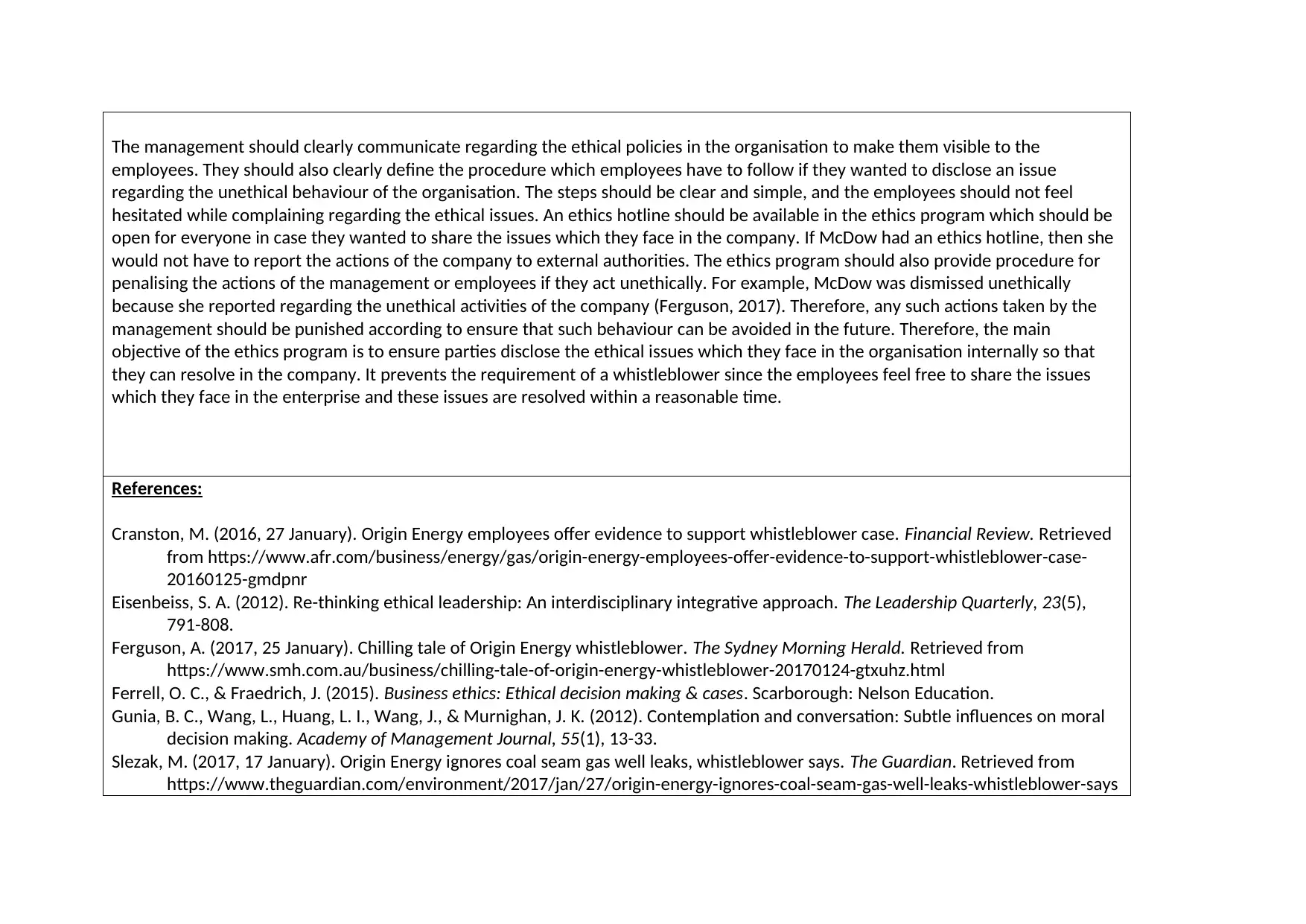
The management should clearly communicate regarding the ethical policies in the organisation to make them visible to the
employees. They should also clearly define the procedure which employees have to follow if they wanted to disclose an issue
regarding the unethical behaviour of the organisation. The steps should be clear and simple, and the employees should not feel
hesitated while complaining regarding the ethical issues. An ethics hotline should be available in the ethics program which should be
open for everyone in case they wanted to share the issues which they face in the company. If McDow had an ethics hotline, then she
would not have to report the actions of the company to external authorities. The ethics program should also provide procedure for
penalising the actions of the management or employees if they act unethically. For example, McDow was dismissed unethically
because she reported regarding the unethical activities of the company (Ferguson, 2017). Therefore, any such actions taken by the
management should be punished according to ensure that such behaviour can be avoided in the future. Therefore, the main
objective of the ethics program is to ensure parties disclose the ethical issues which they face in the organisation internally so that
they can resolve in the company. It prevents the requirement of a whistleblower since the employees feel free to share the issues
which they face in the enterprise and these issues are resolved within a reasonable time.
References:
Cranston, M. (2016, 27 January). Origin Energy employees offer evidence to support whistleblower case. Financial Review. Retrieved
from https://www.afr.com/business/energy/gas/origin-energy-employees-offer-evidence-to-support-whistleblower-case-
20160125-gmdpnr
Eisenbeiss, S. A. (2012). Re-thinking ethical leadership: An interdisciplinary integrative approach. The Leadership Quarterly, 23(5),
791-808.
Ferguson, A. (2017, 25 January). Chilling tale of Origin Energy whistleblower. The Sydney Morning Herald. Retrieved from
https://www.smh.com.au/business/chilling-tale-of-origin-energy-whistleblower-20170124-gtxuhz.html
Ferrell, O. C., & Fraedrich, J. (2015). Business ethics: Ethical decision making & cases. Scarborough: Nelson Education.
Gunia, B. C., Wang, L., Huang, L. I., Wang, J., & Murnighan, J. K. (2012). Contemplation and conversation: Subtle influences on moral
decision making. Academy of Management Journal, 55(1), 13-33.
Slezak, M. (2017, 17 January). Origin Energy ignores coal seam gas well leaks, whistleblower says. The Guardian. Retrieved from
https://www.theguardian.com/environment/2017/jan/27/origin-energy-ignores-coal-seam-gas-well-leaks-whistleblower-says
employees. They should also clearly define the procedure which employees have to follow if they wanted to disclose an issue
regarding the unethical behaviour of the organisation. The steps should be clear and simple, and the employees should not feel
hesitated while complaining regarding the ethical issues. An ethics hotline should be available in the ethics program which should be
open for everyone in case they wanted to share the issues which they face in the company. If McDow had an ethics hotline, then she
would not have to report the actions of the company to external authorities. The ethics program should also provide procedure for
penalising the actions of the management or employees if they act unethically. For example, McDow was dismissed unethically
because she reported regarding the unethical activities of the company (Ferguson, 2017). Therefore, any such actions taken by the
management should be punished according to ensure that such behaviour can be avoided in the future. Therefore, the main
objective of the ethics program is to ensure parties disclose the ethical issues which they face in the organisation internally so that
they can resolve in the company. It prevents the requirement of a whistleblower since the employees feel free to share the issues
which they face in the enterprise and these issues are resolved within a reasonable time.
References:
Cranston, M. (2016, 27 January). Origin Energy employees offer evidence to support whistleblower case. Financial Review. Retrieved
from https://www.afr.com/business/energy/gas/origin-energy-employees-offer-evidence-to-support-whistleblower-case-
20160125-gmdpnr
Eisenbeiss, S. A. (2012). Re-thinking ethical leadership: An interdisciplinary integrative approach. The Leadership Quarterly, 23(5),
791-808.
Ferguson, A. (2017, 25 January). Chilling tale of Origin Energy whistleblower. The Sydney Morning Herald. Retrieved from
https://www.smh.com.au/business/chilling-tale-of-origin-energy-whistleblower-20170124-gtxuhz.html
Ferrell, O. C., & Fraedrich, J. (2015). Business ethics: Ethical decision making & cases. Scarborough: Nelson Education.
Gunia, B. C., Wang, L., Huang, L. I., Wang, J., & Murnighan, J. K. (2012). Contemplation and conversation: Subtle influences on moral
decision making. Academy of Management Journal, 55(1), 13-33.
Slezak, M. (2017, 17 January). Origin Energy ignores coal seam gas well leaks, whistleblower says. The Guardian. Retrieved from
https://www.theguardian.com/environment/2017/jan/27/origin-energy-ignores-coal-seam-gas-well-leaks-whistleblower-says
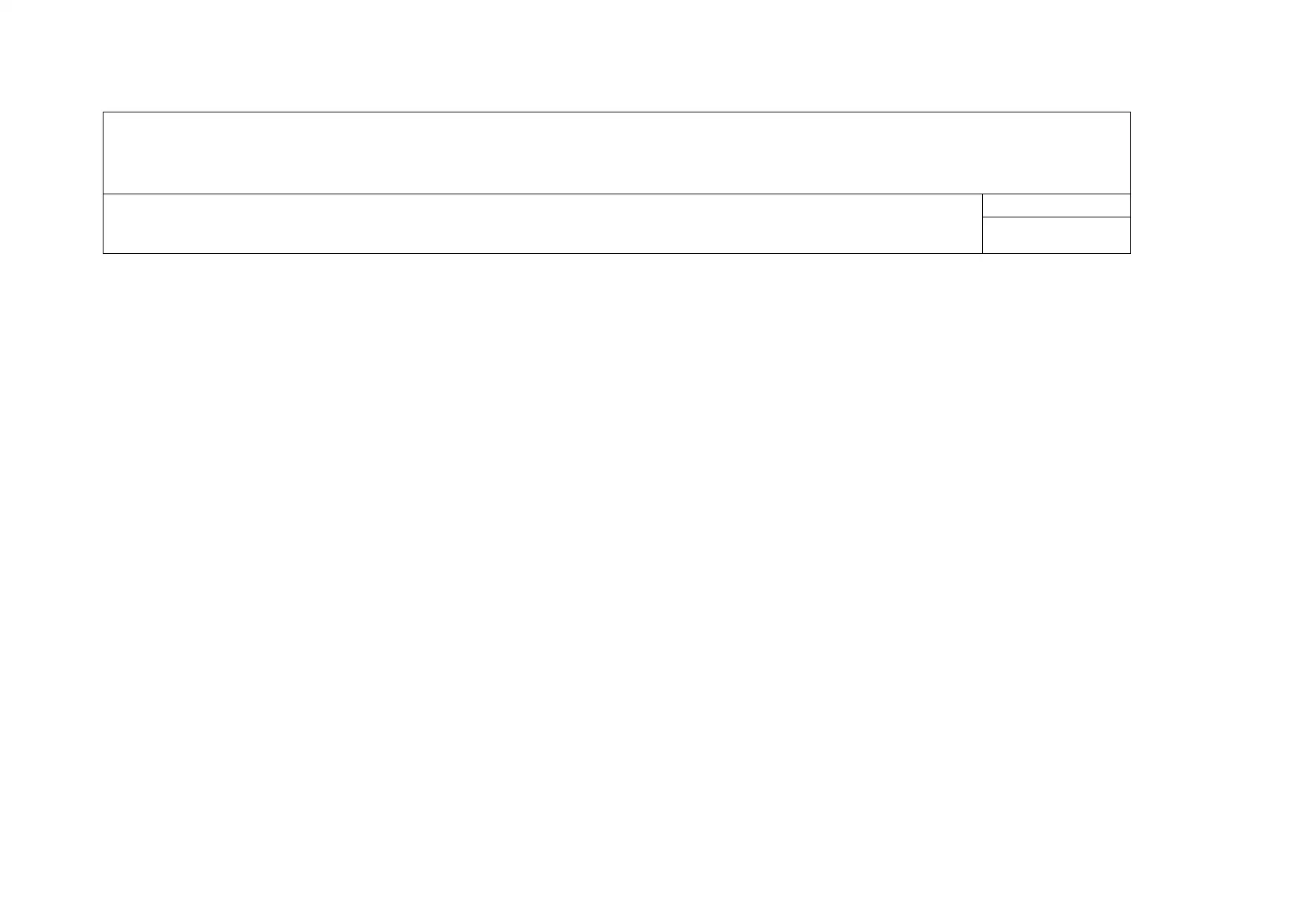
⊘ This is a preview!⊘
Do you want full access?
Subscribe today to unlock all pages.

Trusted by 1+ million students worldwide
1 out of 12
Related Documents
Your All-in-One AI-Powered Toolkit for Academic Success.
+13062052269
info@desklib.com
Available 24*7 on WhatsApp / Email
![[object Object]](/_next/static/media/star-bottom.7253800d.svg)
Unlock your academic potential
Copyright © 2020–2026 A2Z Services. All Rights Reserved. Developed and managed by ZUCOL.



